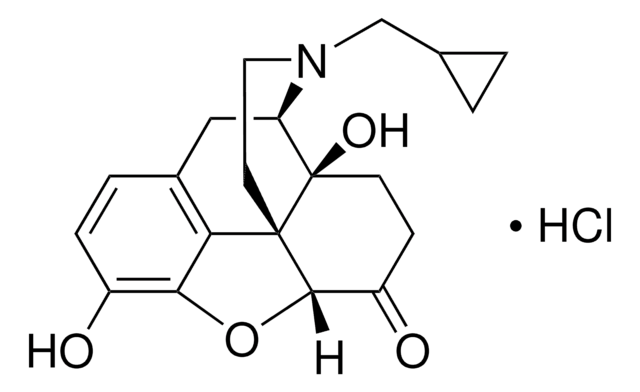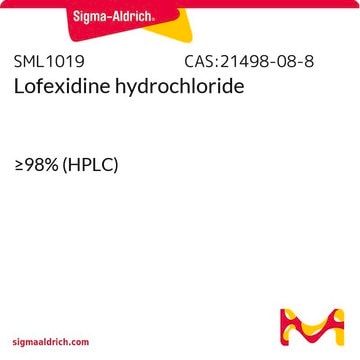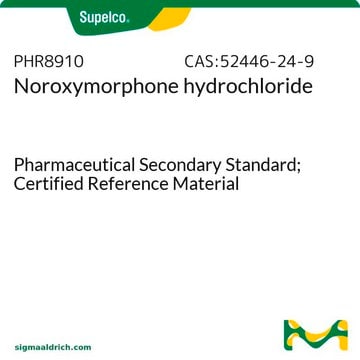N7758
Naloxone hydrochloride dihydrate
≥98% (TLC and titration), powder
About This Item
Produits recommandés
Niveau de qualité
Essai
≥98% (TLC and titration)
Forme
powder
Activité optique
[α]25/D −178.6°, c = 2.5 in H2O(lit.)
Couleur
white to off-white
Solubilité
ethanol: 3.3 mg/mL
H2O: 50 mg/mL
Température de stockage
2-8°C
Chaîne SMILES
O.O.Cl.Oc1ccc2C[C@H]3N(CC[C@@]45[C@@H](Oc1c24)C(=O)CC[C@@]35O)CC=C
InChI
1S/C19H21NO4.ClH.2H2O/c1-2-8-20-9-7-18-15-11-3-4-12(21)16(15)24-17(18)13(22)5-6-19(18,23)14(20)10-11;;;/h2-4,14,17,21,23H,1,5-10H2;1H;2*1H2/t14-,17+,18+,19-;;;/m1.../s1
Clé InChI
TXMZWEASFRBVKY-IOQDSZRYSA-N
Informations sur le gène
human ... OPRD1(4985) , OPRK1(4986) , OPRM1(4988) , OPRS1(10280)
Vous recherchez des produits similaires ? Visite Guide de comparaison des produits
Application
- isotonic saline and injected subcutaneously into experimental rats to study its involvement with withdrawal syndrome in morphine-dependent rats
- as opioid receptor antagonist to examine the role of the endogenous opioid system in infantile amnesia for contextual fear
- as a reference neutral antagonist to define the maximum effect (Emax) of the system
Actions biochimiques/physiologiques
Caractéristiques et avantages
Attention
Mention d'avertissement
Warning
Mentions de danger
Conseils de prudence
Classification des risques
Eye Irrit. 2 - Skin Irrit. 2 - STOT SE 3
Organes cibles
Respiratory system
Code de la classe de stockage
11 - Combustible Solids
Classe de danger pour l'eau (WGK)
WGK 3
Point d'éclair (°F)
Not applicable
Point d'éclair (°C)
Not applicable
Équipement de protection individuelle
dust mask type N95 (US), Eyeshields, Gloves
Faites votre choix parmi les versions les plus récentes :
Certificats d'analyse (COA)
Vous ne trouvez pas la bonne version ?
Si vous avez besoin d'une version particulière, vous pouvez rechercher un certificat spécifique par le numéro de lot.
Déjà en possession de ce produit ?
Retrouvez la documentation relative aux produits que vous avez récemment achetés dans la Bibliothèque de documents.
Les clients ont également consulté
Notre équipe de scientifiques dispose d'une expérience dans tous les secteurs de la recherche, notamment en sciences de la vie, science des matériaux, synthèse chimique, chromatographie, analyse et dans de nombreux autres domaines..
Contacter notre Service technique











